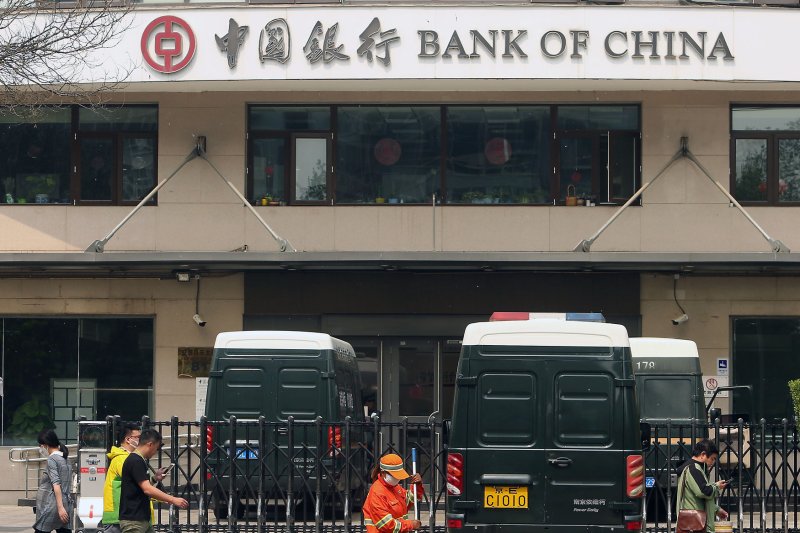1 of 2 | Chinese walk past a Bank of China branch in Beijing on April 18, 2019. U.S. banks, once considered the most powerful in the world, are now ranked second to China's massive banking system. The top four banks in the world are from China, according to the latest annual rankings by S&P Global Market Intelligence. In order of size: Industrial and Commercial Bank of China (ICBC), China Construction Bank, Agricultural Bank of China (ABC) and Bank of China. Photo by Stephen Shaver/UPI |
License Photo
June 27 (UPI) -- The United States Senate passed a bill on Thursday that would strengthen sanctions on North Korea, particularly targeting Chinese banks that work with Pyongyang to skirt existing restrictions.
The Otto Warmbier Banking Restrictions Involving North Korea Act was added to the National Defense Authorization Act for 2020, a $750 billion defense budget and spending bill that passed the Senate with an 86-8 vote.
Based on legislation introduced earlier this year by Sens. Pat Toomey (R-Pa.) and Chris Van Hollen (D-Md.), the measure imposes mandatory secondary sanctions on financial entities that do business with North Korea regime and those who evade sanctions to assist the regime.
At a press conference on Thursday, Toomey said that the sanctions present Chinese banks with "a very simple choice."
"You can do business with the United States, or you can do business with North Korea," he said. "But you can't do business with both. And for most, that's not a close call."
A 2018 United Nations report found more than 200 illicit Chinese joint ventures with North Korea.
"Let me just emphasize the fact that the current sanctions regime is leaking," said the BRINK Act's co-sponsor, Van Hollen.
The Maryland Democrat said that a breakdown in nuclear negotiations between the United States and North Korea was the reason to push for the legislation in the new defense act. There has been little movement since the February summit between President Trump and North Korean leader Kim Jong Un in Hanoi, Vietnam, ended abruptly without an agreement.
"We had the Singapore summit and the Hanoi summit and we held off on pushing the legislation during those negotiations, but now that they've fallen apart, we thought it was important to take this next step," Van Hollen said at the press conference.
"It's critical that we exert maximum pressure on the North Korean regime to achieve our goal of denuclearization on the Korean peninsula," he added.
Also attending the press conference were Sens. Sherrod Brown (D-Ohio) and Rob Portman (R-Ohio), who represent the home state of Otto Warmbier, the American student for whom the legislation was named.
Warmbier was imprisoned in North Korea for 17 months before being released in a vegetative state in June 2017. He died days later.
The new measure is based on the secondary sanctions that were imposed on Iran by Congress in 2010 and 2012.
The Defense Authorization Act will need to be reconciled with a version from the House of Representatives before being signed into law by President Trump. It is unclear whether the new sanctions will be included in the final version.
"This legislation will strengthen the hand of U.S. negotiators, if and when negotiations should become meaningful," said Toomey. "And I would urge our House colleagues to keep something like this."
The passage by the Senate comes days after the Washington Post reported that a U.S. judge had found three large Chinese banks in contempt for refusing to comply with subpoenas in a probe into North Korean sanctions.
The Chinese banks were not named but are believed to be state-owned Bank of Communications, China Merchants Bank and Shanghai Pudong Development Bank, whom the Justice Department has accused in the past of laundering more than $100 million for North Korea's sanctioned Foreign Trade Bank.
In March, Trump tweeted that he had prevented additional sanctions on North Korea and has continued to maintain that he has a warm personal relationship with Kim, with whom he has recently exchanged letters.
However, Toomey said that he was not aware of any resistance by the Trump administration against the new sanctions.
"We've worked with administration officials, and I think they welcome tightening the screws on North Korea," he said. "They recognize the need for that."
Trump is scheduled to arrive in Seoul on Saturday after the G20 Summit of world leaders concludes in Osaka, Japan. He will meet with South Korean President Moon Jae-in, but the White House has said there is no meeting with Kim planned.
The 2020 defense act also restricts the unilateral drawdown of U.S. troops in South Korea below its current level of 28,500. It prohibits the use of funds for a reduction unless the defense secretary consults with allies including Japan and South Korea and testifies to Congress that the move is in the interest of U.S. national security.















